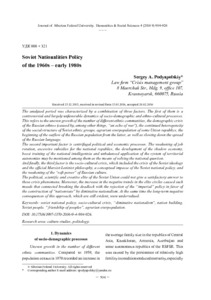Soviet Nationalities Policy of the 1960s – early 1980s
Скачать файл:
URI (для ссылок/цитирований):
https://elib.sfu-kras.ru/handle/2311/20202Автор:
Podyapolskiy, Sergey A.
Подъяпольский, С.А.
Дата:
2016-04Аннотация:
The analyzed period was characterized by a combination of three factors. The first of them is a
controversial and largely unfavorable dynamics of socio-demographic and ethno-cultural processes.
This refers to the uneven growth of the number of different ethnic communities, the demographic crisis
of the Russian ethnos (caused by, among other things, “an echo of war”), the continued heterogeneity
of the social structure of Soviet ethnic groups, agrarian overpopulation of some Union republics, the
beginning of the outflow of the Russian population from the latter, as well as slowing down the spread
of the Russian language.
The second important factor is centrifugal political and economic processes. The weakening of job
rotation, excessive subsidies for the national republics, the development of the shadow economy,
boost training of the national intelligentsia and unbalanced application of the system of territorial
autonomies may be mentioned among them as the means of solving the national question.
And finally, the third factor is the socio-cultural crisis, which included the crisis of the Soviet ideology
and the official Marxist-Leninist philosophy, a conceptual impasse of the Soviet national policy, and
the weakening of the “soft power” of Russian culture.
The political, scientific and creative elite of the Soviet Union could not give a satisfactory answer to
these crisis phenomena. Moreover, the increase in the negative trends in the elite circles caused such
moods that connected breaking the deadlock with the rejection of the “imperial” policy in favor of
the construction of “nationstate” by diminutive nationalism. At the same time the long-term negative
consequences of this approach, which are still evident, were undervalued Анализируемый период характеризовался сочетанием трех факторов. Первый из них –
противоречивая и во многом неблагоприятная динамика социально-демографических и
этнокультурных процессов. Речь идет о неравномерном росте численности различных
этнических общностей, демографическом кризисе русского этноса (вызванном в том числе
«эхом войны»), сохраняющейся неоднородности социальной структуры советских этносов,
аграрном перенаселении ряда союзных республик, начале оттока русского населения из
последних, а также о замедлении темпов распространения русского языка.
Второй важный фактор – центробежные политические и экономические процессы. В их
числе следует назвать ослабление ротации кадров, избыточное дотирование национальных
республик, развитие теневой экономики и форсированную подготовку национальных
интеллигенций и несбалансированное применение системы территориальных автономий как
средство решения национального вопроса.
И, наконец, третий фактор – социокультурный кризис, включавший кризис советской
идеологии и официальной марксистско-ленинской философии, концептуальный тупик
советской национальной политики и ослабление «мягкой силы» русской культуры.
Политическая, научная и творческая элиты Советского Союза не смогли дать
удовлетворительного ответа на эти кризисные явления. Более того, по мере усиления
негативной динамики в элитных кругах возобладали настроения, связывающие выход из тупика
с отказом от «имперской» политики в пользу строительства «национального государства»
путем уменьшительного национализма. При этом были недооценены долгосрочные негативные
последствия такого подхода, дающие знать о себе и по настоящее время
Коллекции:
Метаданные:
Показать полную информациюСвязанные материалы
Показаны похожие ресурсы по названию, автору или тематике.
-
National Idea in Russia: Cultural and Historical Genesis and Factors of Actualization
Karlova, Olga A.; Карлова, О. А. (Сибирский федеральный университет. Siberian Federal University, 2019-06)The article is devoted to the problem of national idea in Russia in the context of sustainable cultural meanings. The subject of this research is determined by actualization in the modern Russian public consciousness of ... -
National Idea in Russia: Cultural and Historical Genesis and Factors of Actualization
Карлова, Ольга Анатольевна (2019-06)The article is devoted to the problem of national idea in Russia in the context of sustainable cultural meanings. The subject of this research is determined by actualization in the modern Russian public consciousness of ... -
Nationalities Policy of the First Year of the Soviet Regime
Podyapolskiy, Sergey A.; Подъяпольский, С.А. (Сибирский федеральный университет. Siberian Federal University, 2018-05)On the basis of the primary sources of references, the author presents Lenin’s nationalities policy not as a dogmatic implementation of a theoretically constructed doctrine, but as a flexible set of political tactics ... -
Решение национального вопроса в Советской России в 1920-е гг. в восприятии русской эмиграции
Урядова, А.В.; Uryadova, Anna V. (Сибирский федеральный университет. Siberian Federal University., 2011-04)Article considers the attitude of Russian emigration to solving the national question in Soviet Russia. It examines the reaction of emigration on the creation of the USSR and the occurrence of the some territories in ... -
Государственные учреждения и научные организации и их роль в этнографическом изучении севера сибири (1920–1930-е гг.)
Danileiko, Victoriya A.; Данилейко, В.А. (Сибирский федеральный университет. Siberian Federal University., 2013-06)This article attempts to give an overview of the history of the organization of the ethnographic study of the indigenous people of the North of Siberia in the first decades of Soviet rule. The activities and interconnections ...

